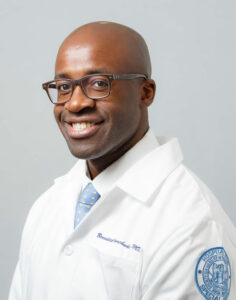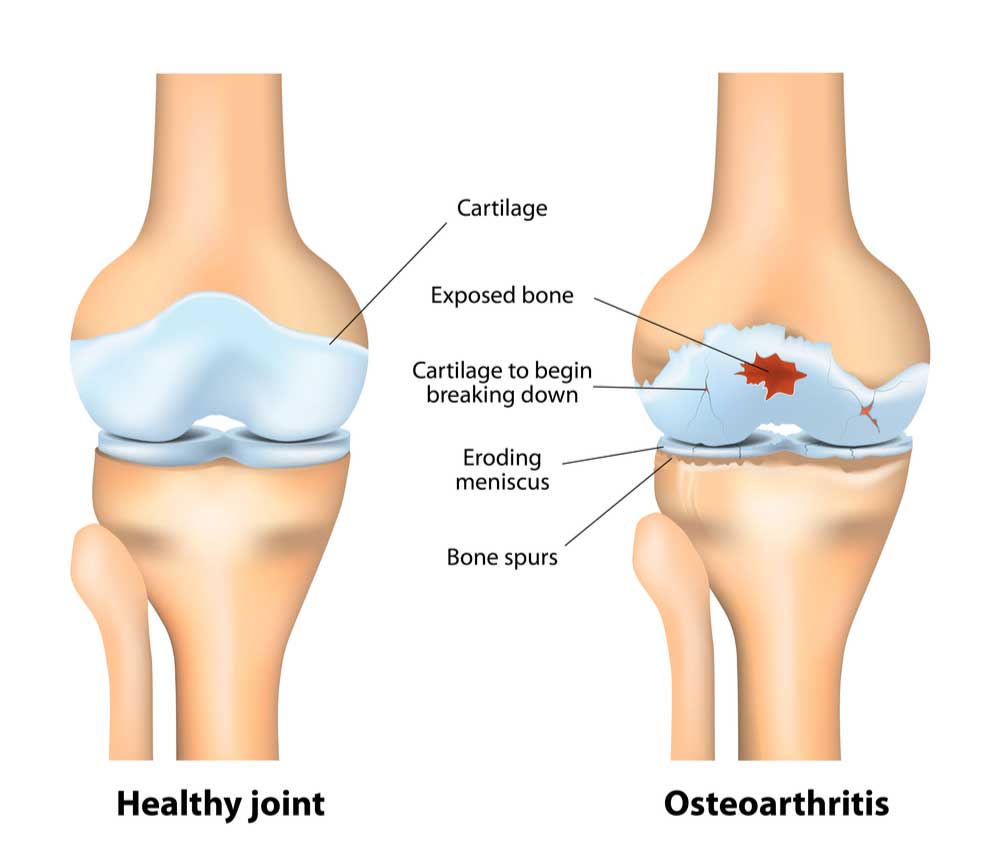Knee Arthritis Specialist

There are various types of arthritis, but the two most common are osteoarthritis and rheumatoid arthritis. If you are experiencing pain and swelling of the knee, joint stiffness, knee instability and creaking, cracking or popping of the joint you may have arthritis of the knee. Knee arthritis specialist, Doctor Benedict Nwachukwu provides diagnosis as well as surgical and nonsurgical treatment options for patients in Manhattan, New York City, NY who have developed knee arthritis. Contact Dr. Nwachukwu’s team today!
What is knee arthritis?
The word arthritis means “inflamed joint” and can occur in any joint in the body but is most commonly found in the knee. The primary symptoms of arthritis include pain, swelling and stiffness. Knee arthritis can make it difficult to perform daily activities, even something as simple as walking or climbing stairs. Although there is no cure for knee arthritis, there are many different effective treatment options for individuals in Manhattan, New York City and the surrounding New York boroughs. Dr. Benedict Nwachukwu, orthopedic knee specialist treats knee arthritis and is an expert in helping patients return to a pain-free lifestyle.

What is osteoarthritis?
There are various types of arthritis, but the two most common are osteoarthritis and rheumatoid arthritis. While arthritis is usually an adult disease, some forms of arthritis affect children. In osteoarthritis, the articular cartilage in the knee joint gradually wears away. As the cartilage wears, it becomes rough and frayed, decreasing the protective barrier between the bones. This can result in a bone-on-bone motion which can cause painful bone spurs. Also known as wear-and-tear arthritis, this form of osteoarthritis occurs most often in individuals over the age of 50.
What causes osteoarthritis in the knee?
Almost everyone will develop some from of osteoarthritis in their lifetime. Advanced age is the most common cause because the ability to heal cartilage decreases with age. Other causes and factors include:
- Weight: Excessive weight increases pressure on the knee joints, causing a more rapid wear-and-tear on the cartilage.
- Sex: Women are more likely to develop knee osteoarthritis. Some experts believe this could be due to hormone imbalances women experience during their lifetime.
- Heredity: Inherited abnormalities in the shape of the bones can contribute to early osteoarthritis of the knees. In addition, osteoarthritis is more prevalent in some families and is thought to have an inherited component.
- Athletes: It is important to note that regular exercise has been shown to strengthen the joints and can reduce the risk of knee arthritis. However some athletic activities, can put individuals at a higher risk for developing knee osteoarthritis.
- Repetitive Stress: Constant pressure on the knee joint, as seen in heavy lifting, kneeling or squatting can stress the knee joint and lead to knee osteoarthritis.
- Previous joint injury: Trauma, accidents or other injuries to the joint can cause early wear to the cartilage and can result in early knee osteoarthritis.
- Other Illness: Metabolic disorders, auto immune diseases and other underlying health conditions can contribute to early knee osteoarthritis.
Are there stages of knee osteoarthritis?
Arthritis of the knee can develop slowly, over time. The amount of wear and damage of the cartilage is how osteoarthritis is classified.
- Grade 0: Healthy knee without damage to the articular cartilage.
- Grade 1: Minor damage or softening to the cartilage. The cartilage may be showing fissures or pitting in the surface.
- Grade 3: Moderate damage to the articular cartilage with noticeable signs of wear. Fissures can be visible, down to the bone.
- Grade 4: Severe damage to the articular cartilage that can be completely worn away. This stage of osteoarthritis of the knee has bone-on-bone contact.
What are the symptoms of knee arthritis?
We all have that one relative who can tell when a storm is coming, from the ache in their joints. Not surprisingly, joint pain before rainy weather or a storm can be a symptom of arthritis. Other symptoms of knee arthritis may include:
- Pain and swelling in the knee
- Joint stiffness and decreased ability to bend or straighten the knee fully
- Pain in the knee joint that is worse in the morning or after sitting and resting
- Feeling the knee “give way” or buckle with joint weakness
- Creaking, cracking or popping in the joint
- Pain increasing with vigorous activity
How is osteoarthritis of the knee diagnosed?
Diagnosis of knee osteoarthritis is not always straight forward and simple, because an x-ray does not always pick up subtle changes of the knee or articular cartridge. Dr. Nwachukwu will obtain a complete family and medical history as well as perform a physical examination to determine the cause of knee pain. X-rays and an MRI may be helpful for Dr. Nwachukwu to diagnose the cause of knee pain and to form a plan of treatment.
How is knee arthritis treated?
The primary goal of knee arthritis treatment is to alleviate pain and return patients to their regular activities. Dr. Nwachukwu prefers to try a conservative approach before a surgical treatment which may include:
Non-surgical Treatment:
- NSAIDs: Non-steroidal anti-inflammatory medicine to alleviate pain and promote healing.
- Exercise: Physical therapy that strengthens the surrounding muscles of the knee will help make the joint more stable and will decrease pain. Stretching exercises can help make the joint more flexible.
- Weight loss: Even small amounts of weight loss can take pressure off of the articular cartilage and reduce the amount of load across the knee.
- Corticosteroid injections: Dr. Nwachukwu may use an injection of corticosteroids or hyaluronic acid into the knee. Steroids are powerful anti-inflammatory drugs. Hyaluronic acid is normally in the knee and helps lubricate the joint for smoother motion.
Surgical Treatment:
If non-operative measures have not given patients in New York relief from the painful symptoms of knee osteoarthritis, surgical treatment may be an option. There are several different treatment options available, depending on the condition of the knee. Dr. Nwachukwu may suggest one or more of the following:
- Arthroscopic Knee Surgery: Not often used to treat knee arthritis, but in cases where osteoarthritis is accompanied by a degenerative meniscal tear, arthroscopic surgery may be recommended to treat the torn meniscus and associated mechanical symptoms.
- Cartilage Grafting: Reserved for younger patients who have a small area of cartilage damage, normal healthy cartilage tissue may be used to fill a hole in the articular cartilage.
- Synovectomy: Used primarily with rheumatoid arthritis of the knee, the damaged joint lining is removed to reduce pain and swelling.
- Osteotomy: Used for early-stage knee osteoarthritis that has damaged one side of the knee joint. The procedure reshapes the bone to shift the weight off of the damaged side of the joint. Osteotomy can relieve pain and significantly improve function in the arthritic knee.
- Articular Cartilage Restoration: Restores the damaged articular cartilage and eliminates the bone-on-bone wearing of the joint.
- Total or Partial Knee Replacement (arthroplasty):Used when osteoarthritis is advanced. Dr. Nwachukwu removes the damaged cartilage and bone, and then positions new metal or plastic joint surfaces to restore the function of the knee.
For more resources on knee arthritis and osteoarthritis and the treatment options available, please contact the office of Benedict Nwachukwu, MD, orthopedic knee specialist serving Manhattan, New York City and the surrounding New York boroughs.





